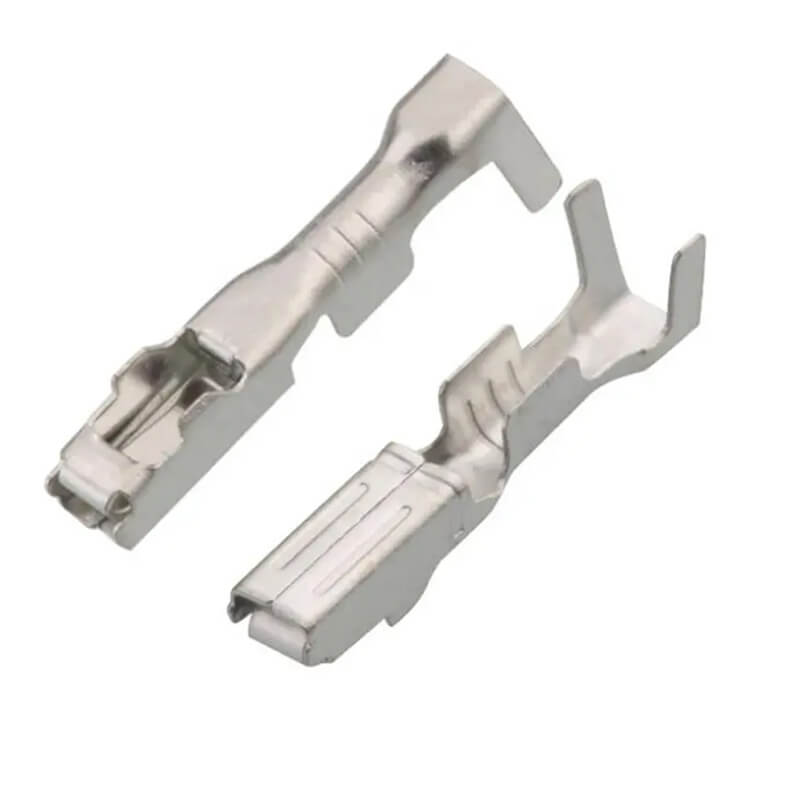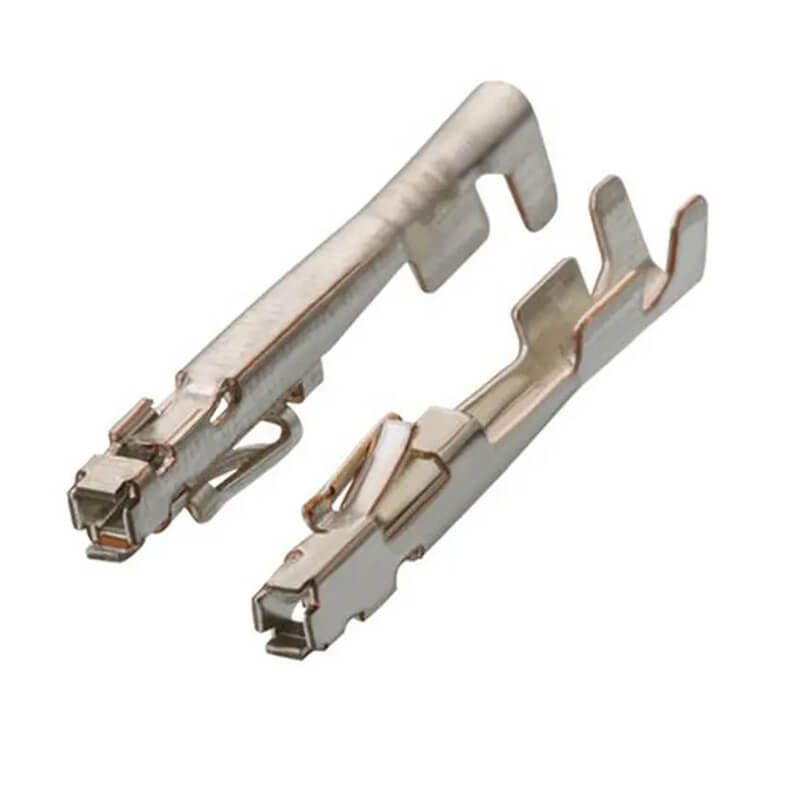 Electrical terminals
Electrical terminalsElectrical Terminals are connectors used to join, Terminate, or connect wires in electrical circuits. They play a vital role in facilitating the flow of electrical current while ensuring secure and reliable connections. These terminals come in various types, including spade, ring, and bullet terminals, each designed for specific applications.
Product Type Features | |
| Sealable | No |
| Primary Locking Feature | Locking Lance |
| Receptacle Style | 180° |
| Contact Features | |
| Crimp Type | F-Crimp |
| Typical Current Rating (A) | 4 |
| Wire Contact Termination Area Plating Material | Tin |
| Contact Fabrication | Stamped & Formed |
| Contact Size | 64mm |
| Terminal Type | Receptacle |
| Mating Tab Width | .64 mm [ .025 in ] |
| Mating Tab Thickness | .64 mm [ .025 in ] |
| Interface Plating | Tin (Sn) |
| Termination Features | |
| Termination Method to Wire & Cable | Crimp |
| Product Terminates To | Wire |
| Dimensions | |
| Compatible Insulation Diameter Range | .95 – 1.72 mm [ .037 – .067 in ] |
| Wire Size (AWG) | 24 – 20 |
| Wire Size (mm²) | .22 – .56 |
| Wire Size Search (mm²) | .2, .25, .3, .4, .5 |
| Wire Size Search (AWG) | 20, 21, 22, 23, 24 |
| Usage Conditions | |
| Insulation Option | Uninsulated |
| Operating Temperature (Max) (°C) | 80, 85, 90, 100, 105, 110, 120 |
| Operating Temperature (Max) (°F) | 176, 185, 194, 212, 221, 230, 248 |
| Operating Temperature Range | -40 – 120 °C [ -40 – 248 °F ] |
| Operation/Application | |
| Compatible With Wire Base Material | Copper |
| Packaging Features | |
| Packaging Method | Reel |
| Packaging Quantity | 10000 |
| Other | |
| Terminal Transmits | 0 – 24 A (Low Power) |
Advantages
Conductivity: Electrical terminals, often made of materials like copper or aluminum, offer high electrical conductivity. This property ensures efficient transmission of electrical currents with minimal resistance.
Versatility: Electrical terminals come in various types and configurations, making them versatile for different applications. Whether connecting wires, components, or devices, terminals provide adaptable solutions.
Ease of Installation: Many electrical terminals are designed for easy installation, often involving crimping, soldering, or screwing. This facilitates quick and reliable connections in various electrical systems.
Corrosion Resistance: Terminals are often coated or made from materials resistant to corrosion. This feature enhances their durability, particularly in environments where exposure to moisture or other corrosive elements is a concern.
 Applications
ApplicationsAutomotive Industry: Electrical terminals play a vital role in automotive systems, connecting various components such as batteries, sensors, and lights. They ensure reliable electrical connections in vehicles.
Telecommunications: Terminals are widely used in telecommunications equipment and systems. They facilitate the connection of wires and cables, ensuring seamless communication networks.
Industrial Machinery: Electrical terminals are integral components in industrial machinery, connecting wires and components to enable the proper functioning of equipment in manufacturing and processing industries.
Electronics: In the realm of electronics, terminals are employed in circuit boards and devices, providing connections for power sources, sensors, and other electronic components.
In summary, electrical terminals offer advantages such as conductivity, versatility, and ease of installation, making them essential in diverse applications ranging from automotive and telecommunications to industrial machinery and renewable energy systems. Their reliability and adaptability contribute to the efficiency and functionality of various electrical systems.
What Is a Terminal Electrical?
An electrical terminal is a device used in electrical and electronics applications to connect, terminate, or join wires or conductors. It serves as a point of connection for electrical currents to flow, providing a secure and reliable electrical connection. Terminals come in various forms, such as screws, crimp connectors, and soldered joints, depending on the application's requirements.
What Are the Different Types of Wire Terminals?
There are several types of wire terminals, including ring terminals, spade terminals, bullet terminals, butt connectors, and fork terminals. Each type is designed for specific applications and offers unique features, ensuring a proper and secure connection in electrical and electronic systems.
How Do I Identify an Electrical Terminal?
Identifying electrical terminals involves understanding their shape, size, and purpose. Terminals are often color-coded or labeled for easy recognition. Additionally, consulting wiring diagrams or manufacturer documentation can provide essential information about terminal identification in various electrical devices and systems.
What Is the Use of Electrical Terminals?
Electrical terminals serve a crucial role in creating reliable electrical connections. They are essential components in wiring systems for various applications, including automotive, industrial machinery, electronics, and household appliances. Terminals ensure efficient power transmission, help prevent loose connections, and facilitate maintenance and repairs in electrical systems.
Electrical terminals are commonly found in automotive wiring, household electrical systems, industrial machinery, and electronics. Their proper use ensures efficient electrical conductivity, minimizes the risk of loose connections, and simplifies maintenance and repairs in electrical systems.